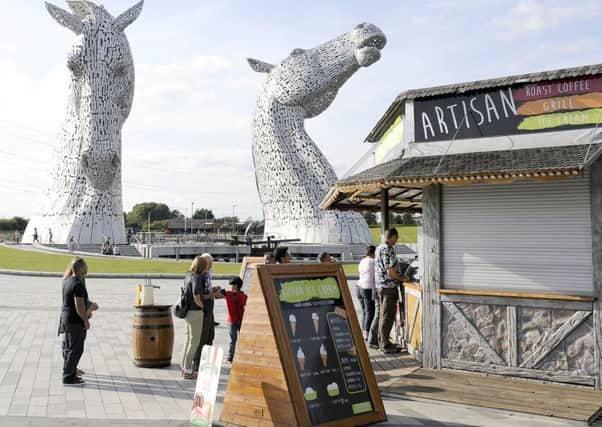Bill Jamieson: Brexit cannot be blamed for Scotland's latest economic own goal


Own goals seem a perpetual hazard in Scottish business and economic life. Prominent among them this summer was the move by Glasgow-based Supreme Fast Foods to open a burger stall beside the Kelpies sculptures.
Seldom has there been a better opportunity to market the best of Scotland’s food and drink. The Kelpies site would be a fantastic landmark for such a showcase. But instead Falkirk Community Council granted permission for a faux Bavarian burger bar which even had the gall to offer “Kelpie burgers”.
Advertisement
Hide AdAdvertisement
Hide AdLittle wonder that Kelpies creator Andy Scott saw red and appealed to Falkirk Council threatening legal action. The council has since withdrawn permission but its decision is now being appealed.
All too often we demonstrate a perverse skill in plucking failure out of the jaws of opportunity – from mis-allocated resources to policy fixations that instead of creating opportunities leave us worse off. Our economic performance today is now notably lagging that of the UK. In the first quarter our growth rate plunged to zero – and on some measures fell back on the level a year ago.
For months business surveys and official figures have been pointing to slowdown. The reason most often cited is Brexit. But many in business cite causes closer to home – and the chief one has been the repeated Scottish Government calls for a second independence referendum. These were doubtless made in good faith. But they have added materially to business investment and planning uncertainty: a clumsy, misjudged and avoidable own goal. In the past few weeks I have heard numerous instances of slowdown and delays in business and commercial property transactions.
These may now start to recover as the emphasis has switched to securing a good deal for Scotland in negotiations with the EU. And amid the prevailing gloom there are many companies that intend to move forward and make the best of the opportunity.
Nevertheless, continuing job losses in the North Sea, a sluggish performance in housebuilding and lacklustre retail sales figures add to a sense of inertia. The Fraser of Allander Institute (FoA) now predicts the economy in Scotland will grow by just 0.9 per cent this year compared with a prediction of 1.3 per cent growth in June. Next year it looks even worse, with a growth prediction of just 0.5 per cent. Why bother to get out of bed if this is what the future holds?
Not all are so gloomy. Inverness-based Tony Mackay is predicting 1.6 per cent growth for this year and 1.8 per cent in 2017 – three times the growth rate cited by FoA.
Why should we give this forecast any more credence than others? First, because Mackay’s forecasting record has been rather better than that of the Fraser of Allander. Second, because his monthly reports are focused on real world business activity, recording business expansions and retreats, hiring and lay-off announcements and company results. I find these an indispensable ready reckoner of real world business developments in Scotland.
And third, September, he notes, has been “a more positive month”. There is certainly no lack of “lowlights”: more North Sea layoffs, housing completions running more than 2 per cent below last year, a fall in inward investment projects and Scottish Engineering reporting the lowest orders since 2009.
Advertisement
Hide AdAdvertisement
Hide AdBut the list of September “highlights” extends to more than 20 items – prominent among these being news of 100 new jobs at Falkirk-based Alexander Dennis, Ross-shire Engineering winning a £200 million contract to create 120 jobs, ID Systems to create 120 jobs in Glasgow, Lidl to create 100 jobs for its new distribution centre at Eurocentral Lanarkshire and the French owners of Michelin confirming a £15m investment at Dundee.
I’ve excluded from this “good news” list the £527m collected by Revenue Scotland in its first year: there’s only so much upbeat news you can absorb in one month.
However, coming too late for Mackay’s monthly assessment was last week’s survey from the Federation of Small Businesses showing confidence among small firms in Scotland has fallen to its lowest in five years. And firms here were found to be more pessimistic than in other parts of the UK.
Yet there was a paradox at the heart of the survey which showed that across the sector there was a willingness to invest, with a 24 point positive gap between those planning to expand spending and those intending to cut back.
Moreover, the reading on small firms’ views on output has been in decline since the middle of last year, with the “state of the domestic economy” seen as the key problem by many. Scottish policy convener Andy Willox says that while confidence had fallen since the June referendum, “a majority of Scottish businesses have been pessimistic about business prospects for the last nine months”.
Meanwhile Mackay’s report highlights two glaring problems with Scottish government publications on the economy. His worst criticism is reserved for the official media release on the Quarterly National Accounts Scotland (QNAS) report “which made no mention at all of the main statistic… that Scottish GDP had fallen by 0.7 per cent in the first quarter of 2016. The text of the QNAS report itself appears to hide that fact.”
There are other problems, he notes, with official measures of construction projects. “There is little doubt,” he concludes, “that the Scottish economy is performing poorly at the present time and worse than the UK economy as a whole.”
If it is all the fault of Brexit, how should this be so? And if the administration blames “uncertainty” so much, why did it set out regardless to create more of it?